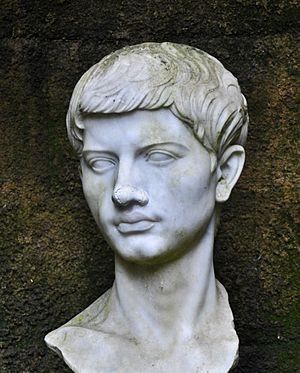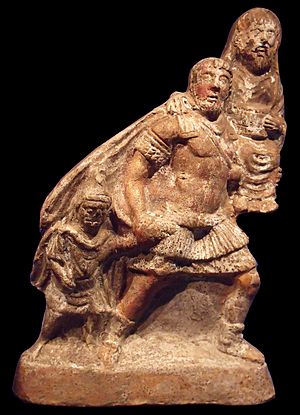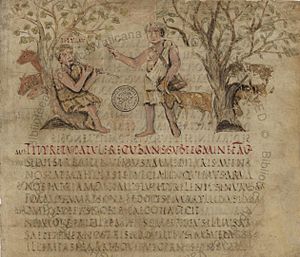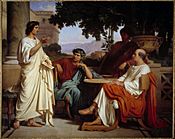Virgil facts for kids
Quick facts for kids
Virgil
|
|
|---|---|

Bust of Virgil at the entrance to his crypt in Naples
|
|
| Born | Publius Vergilius Maro 15 October 70 BC Near Mantua, Cisalpine Gaul, Roman Republic |
| Died | 21 September 19 BC (age 50) Brundisium, Italy, Roman Empire |
| Occupation | Poet |
| Nationality | Roman |
| Genre | Epic poetry, didactic poetry, pastoral poetry |
| Literary movement | Augustan poetry |
Publius Vergilius Maro (born October 15, 70 BC – died September 21, 19 BC), known as Virgil or Vergil in English, was a famous ancient Roman poet. He lived during the time of Augustus, the first Roman emperor.
Virgil wrote three of the most well-known poems in Latin literature: the Eclogues, the Georgics, and the epic poem Aeneid. His work has greatly influenced Western literature. For example, he appears as a guide in Dante's famous poem, the Divine Comedy. Virgil is considered one of Rome's greatest poets, and his Aeneid is seen as a national epic for ancient Rome.
Contents
Virgil's Life and Amazing Poems
How We Know About Virgil
Most of what we know about Virgil comes from old writings by historians and commentators. These writers often used clues from Virgil's own poems to guess about his life. Because of this, some details about his life story are not completely certain.
Virgil was born in a village called Andes, near Mantua in northern Italy. His family was likely well-off and could afford to send him to school. He studied in places like Cremona, Milan, Rome, and Naples. He first thought about a career in law, but he soon decided to become a poet instead.
Early Writings
Virgil started writing poetry while he was studying in Naples. Some short poems, collected in a group called the Appendix Vergiliana, were thought to be written by him when he was young. However, most experts today believe that these poems were not actually written by Virgil.
The Eclogues
Virgil began writing his Eclogues around 42 BC. This collection has ten poems that are like "pastoral" or "rural" poems. They are inspired by the Greek poet Theocritus.
The Eclogues often talk about life in the countryside. They describe farmers, shepherds, and nature. Some of these poems also touch on the difficult times when land was taken from people in northern Italy to give to soldiers. Virgil used these stories to show the feelings caused by these events.
In the Eclogues, Virgil helped create the idea of Arcadia. This is a poetic idea of a perfect, peaceful countryside, which is still important in literature and art today.
The Georgics
After the Eclogues, Virgil became friends with Maecenas. Maecenas was a close advisor to Augustus and helped support many Roman writers. Through Maecenas, Virgil met other famous writers like Horace.
Virgil then spent several years (around 37–29 BC) writing a long poem called the Georgics. This poem is about farming and working the land. He dedicated it to Maecenas.
The Georgics gives instructions on how to run a farm. It covers different topics in its four books:
- Book 1: How to grow crops.
- Book 2: How to grow trees.
- Book 3: How to raise livestock and horses.
- Book 4: How to keep bees.
The poem also includes beautiful descriptions of Italy and stories from mythology.
The Aeneid

The Aeneid is widely seen as Virgil's greatest work. It is one of the most important poems in Western literature. This epic poem tells the story of Aeneas, a hero who flees the Trojan War. He is on a journey to fulfill his destiny: to reach Italy, where his descendants will one day found the city of Rome.
Virgil worked on the Aeneid for the last eleven years of his life (29–19 BC). The Roman emperor Augustus asked him to write it. The poem has 12 books and describes Aeneas's journey from Troy to Italy. It also tells about his battles with the Italian prince Turnus, and the founding of a new city that would lead to Rome.
The first six books of the Aeneid describe Aeneas's travels. He faces storms, meets Queen Dido in Carthage, and visits the Underworld to speak with his father. In the Underworld, his father reveals Rome's future to him.
The last six books focus on Aeneas's arrival in Italy. He forms alliances and fights battles against local tribes. The poem ends with Aeneas defeating and killing Turnus, securing the future for his people in Italy.
Virgil's Death and the Aeneid's Publication
In 19 BC, Virgil traveled to Greece to revise the Aeneid. While there, he became sick with a fever. He died soon after returning to Italy, in the harbor of Brindisi, on September 21, 19 BC.
Virgil had wanted his poem to be burned because he felt it was not finished. However, Emperor Augustus ordered Virgil's friends to publish the Aeneid with as few changes as possible. This is why the poem we have today might have a few lines that Virgil planned to fix.
How Virgil's Name is Spelled
For a long time, Virgil's name was spelled Virgilius. This spelling became common in many European languages. However, scholars later found that the original Roman spelling was Vergilius. Today, both Vergil and Virgil are accepted ways to spell his name in English.
Some people think the spelling Virgilius might have come from a play on words. For example, virg- sounds like the Latin word for 'wand' (uirga), and Virgil was sometimes linked to magic in the Middle Ages. It might also remind people of virgo ('virgin'), possibly because of a Christian interpretation of one of his poems.
See also
 In Spanish: Virgilio para niños
In Spanish: Virgilio para niños
- Quintus Caecilius Epirota
- Dante and Virgil in Hell (1822 painting)
- Dante, led by Virgil, Consoles the Souls of the Envious (1835 painting)
- Francesca da Rimini and Paolo Malatesta Appraised by Dante and Virgil (1835 painting)
- Dante and Virgil (1850 painting)
- The Barque of Dante (1858 painting)



